
|
Outreach: Vembanad Special
|

In the last two quarters of 2012, ATREE organized
one international conference; participated in another
international conference with global policy mandates;
and set up stalls, presented posters and gave talks in two
national conferences. This interaction was in addition to
the talks and lectures that we list later in this newsletter,
to share how our faculty and students have been
engaging with different bodies of audiences.
Are there benefits to researchers halting research long
enough to prepare for, travel to and participate in such
meetings? The short answer is yes: exchanging ideas,
getting critical response on research from peers, learning
the vocabulary of new ideas and concepts from across
countries, disciplines, and diverse stakeholder groups
is a shortcut access to the nuances that underlie new
thinking on environment, development and conservation.
Asia, the world and India: Presented below are snapshot
reports on Biodiversity Asia, Conference of Parties,
National Biodiversity Congress and Indian Biodiversity
Congress.
Conservation is as much about people–their politics,
history, culture, economics, motivations and desires–
as it is about biodiversity, ecology and biophysical
processes. This is all the more intensely experienced by
|
|
natural and social scientists in Asia,
where the context in conservation
and development studies pertains
to human dominated ecosystems,
subsistence level dependence on
natural resources, stark inequities in
sharing of resources, and aspirations
towards Western goals and standards.
Biodiversity Asia 2012, the 2nd Asia
Regional Conference of the Society
for Conservation Biology, held from
7th to 10th August 2012 in Bengaluru,
addressed the peculiarities and
challenges of conservation science
in Asia. The theme of Science,
Policy, Governance is reflected in the
composition of discussants and the
nature of discussions in the various
symposia, talks, panel discussions
and workshops over the five days
of this international conference.
400 participants from 23 countries
attended the conference, organized
by ATREE, SCB and other partners.
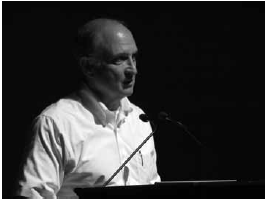 “The truth is that we are in trouble,
and we in the scientific community
have to be truth tellers.”
“The truth is that we are in trouble,
and we in the scientific community
have to be truth tellers.”
Prof. David Orr, noted environmentalist
and professor of Environmental
Studies and Politics, Oberlin College,
USA, presented evidence to warn
that things were going to get hotter,
faster, in more unpredictable ways, in
his inaugural lecture on the science
of global warming and the challenges
before humanity. He emphasized
the need to create sustainable
|
models of living with available, off-the-
shelf technology, and not treat
sustainability as an abstraction.
7 August 2012.
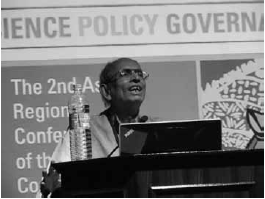 “People have treasured and guarded
our natural heritage and biodiversity
and they need to be placed at the
centre of development.”
“People have treasured and guarded
our natural heritage and biodiversity
and they need to be placed at the
centre of development.”
Dr. Madhav Gadgil, author of the
Western Ghats Ecology Expert Panel
report talked about environmental
misgovernance and the Western
Ghats. “Hope,” he said, “lay in the
democratisation and revival of
community based environmental
governance.” Dr. Gadgil was delivering
the 9th TN Khoshoo Memorial Lecture:
’Western Ghats: Nature, People and
Development’. 8 August 2012.
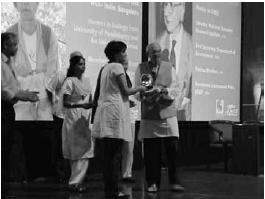 “Wild animals know no borders. In
India, they cannot afford to because
people and their livestock are
everywhere.”
“Wild animals know no borders. In
India, they cannot afford to because
people and their livestock are
everywhere.”
Vidya Athreya, on the leopard. Athreya
was awarded the 2012 TN Khoshoo
|
Memorial Award for Conservation,
Environment and Development for
her pioneering work on the dynamics
of human-leopard encounters; the
ecology and biology of this species;
and the politics and socio-cultural
elements of these encounters.
Athreya is Research Associate with
Pune’s Kaati Trust, and Centre for
Wildlife Studies and Asian Nature
Conservation Foundation, Bengaluru.
8 August 2012.
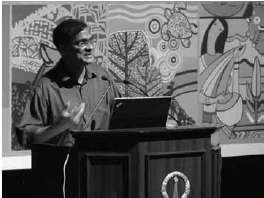 How have societies and landscapes
with a very long history remained
livable over centuries and millennia?
How have societies and landscapes
with a very long history remained
livable over centuries and millennia?
Mahesh Rangarajan, Director, Nehru
Memorial Museum and Library, New
Delhi, on ‘Asia at the Crossroads:
Nature, Nation, and Science in Times
of Change’. 8 August 2012.
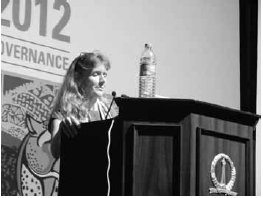 How does a biocultural perspective
influence planning and implementation
in conservation?
How does a biocultural perspective
influence planning and implementation
in conservation?
Plenary session by Dr. Eleanor
Sterling, Center for Biodiversity and
Conservation, American Museum of
|
|
Natural History, USA. 9 August 2012.
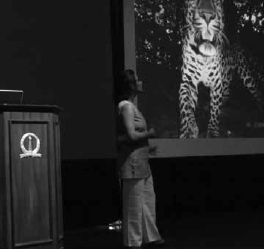 Is science on the conservation
agenda at all?
Is science on the conservation
agenda at all?
Dr. Prahlad Yonzon memorial lecture
by Dr. Kashmira Kakati with examples
from Northeast India. Kakati drew
attention to the fact that the
conservationist’s fight is often a lone
battle against relentless destruction
of rich wildlife habitats and corridors.
10 August 2012.
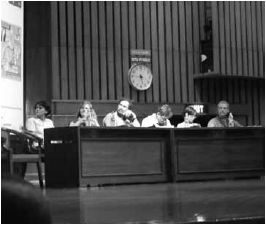 “Whether science is being heard or
not is often a political decision and
scientists must reflect on how far
science should push to influence
policies, especially given that
science has limitations.”
“Whether science is being heard or
not is often a political decision and
scientists must reflect on how far
science should push to influence
policies, especially given that
science has limitations.”
Dr. Damayanti Buchori of Bogor
Agricultural University, Indonesia
at a panel discussion on ‘Science is
from Venus, Policy is from Mars’, a
discussion on the rift that complicates
|
conservation. Other participants
were Dr. Sharad Lele, Convenor of
the Centre for Environment and
Development at ATREE; Dr. Thomas
Brooks, VP for Science and Chief
Scientist at Nature Serve, USA; David
Quammen, noted science writer; Dr.
Eleanor Sterling, Director, Center
for Biodiversity and Conservation,
American Museum of Natural History,
New York, USA. Dr. Kartik Shanker,
Scientist at the Centre for Ecological
Sciences, moderated this session.
9 August 2012.
Book release
Invertebrate diversity and conservation
in the Western Ghats.
Editors: Priyadarsanan Dharma Rajan,
Soubadra Devy, Aravind Madhyastha, K.
A. Subramanian and Seena Narayanan.
On diversity, ecology, biogeography,
behaviour and conservation of
invertebrates of the Western Ghats.
Common dryland trees of Karnataka
Editors: A. Kavitha, N. Deepthi,
R. Ganesan, S. C. Gladwin Joseph
Kannada–English bilingual guide
on common farmland tree species,
and their place in the semi-arid
agricultural-rural landscape of
Karnataka.
Poster event
The conference hosted 26 student
posters, 37 student talks and 24
student speed talks.
Capacity building and skills
training
Tips for writers
Science as story: How to communicate
science to a general audience
David Quammen, science writer on
the practicalities of science writing.
Introduction to open-source GIS and
remote sensing for conservation
|
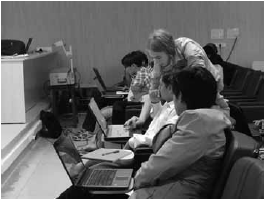
ArcGis and modelling workshop
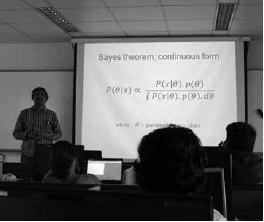
Workshop on Bayesian models in
Conservation Science
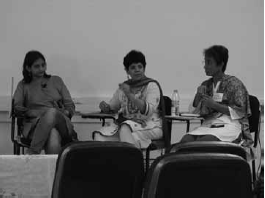
Rethinking conservation education:
Beyond tree planting and painting
competitions. The Conservation
Education Network, India
Awards
Award in the speed talk category
to Roshmi Sharma for ‘Do protected
areas effectively conserve
amphibians of the Western
Ghats?’ Also to Suman Jumani for
‘Determinants of dry season ranging
|
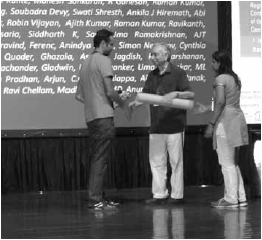
behaviour by Asian elephants in a
fragmented landscape’.
In the regular talks category, to
Sascha Ismail for talk on ‘Identifying
conservation priorities for an
endangered tropical tree in complex
forest agro-ecosystem’. Also to Hari
Shridhar for talk on ‘Identifying
keystone bird species in a mixed species
flock co-occurrence network
in the northern Western Ghats, India’.
The Society for Conservation Biology
(SCB) is an international organization
dedicated to promoting the scientific
study of the phenomena that affect
the maintenance, loss, and restoration
of biological diversity. The present
conference was seen as a precursor
to talks at the Conference of Parties,
taking place in October in Hyderabad.
Dr Simon Nemtzov invited ATREE to
organize the Asia conference when he
visited India in 2010.
The eleventh meeting of the
Convention on Biological Diversity’s
Conference of the Parties (COP 11)
was held in Hyderabad, India, from
8 to 19 October 2012, with the
mandate of finding implementation
solutions to the decisions reached at
the Nagoya Protocol on Access and
|
Benefit Sharing, held last year at the
tenth CoP meet in Japan.
ATREE faculty participated in
talks, poster exhibitions and panel
discussions.
Shrinivas Badiger presented a paper
on ‘Negotiating tradeoffs: making
informed choices about ecosystem
services for poverty alleviation’, to
provide insights gained from expert
and local community meets on
developing better natural resource
management and sharing strategies
for pro-poor ecosystem management.
This was part of the discussions on
Bioeconomy.
Nitin Rai gave a talk on ‘History,
situated knowledge and science in
Protected Area conservation’, in a
panel on Protected Area governance
in India and the Forest Rights Act,
hosted by ATREE partner on FRA
related work, Kalpavriksh.
Harini Nagendra participated in
the Cities for Life summit, sharing
her insights on urban ecology and
public participation. As a run-up to
this event, to illuminate the idea of
biodiversity in urban spaces, ATREE,
the Indian National Trust for Art and
Cultural Heritage (INTACH) Bengaluru,
and Citizen Matters, had organized a
photo competition on urban nature
and people-nature interactions in
Bengaluru. Photographs were invited
in categories: Urban Wetlands,
Heritage Trees, Nature in my Backyard,
People and Nature, Accommodating
Nature within Cities. Some of the
more interesting and thought
provoking images were exhibited at
this urban conclave at CoP.
Ankila Hiremath and Swati Shresth
were other participants at CoP. On
17 October, ATREE organized a
side event focused on reconciling
the need for food security and
meeting growing aspirations for
|
The wise use of common spaces
On Tree Diversity Day, R Ganesan,
Fellow ATREE, spoke about how
ATREE seeded agroforestry initiatives
in three villages in the fringes
of the protected, no-go Kalakad
Mundanthurai Tiger Reserve
landscape, making these villages
self-sufficient in firewood, fodder,
fruit and timber for their use and
sale: all without needing to harvest
inside the reserve.
The team’s observations in KMTR
(one of ATREE’s Community-based
Conservation Centres) was that
despite the declaration of Kalakad
Mundanthurai as a Tiger Reserve, the
villagers’ need for fuelwood exceeded
their fear of reprisal for venturing
into a protected area. As a result,
there was an outflow of almost 28
tons of fuelwood per month from this
protected area, for sale to these three
villages. Through interactions with
smallholder farmers, school children
and households, ATREE researchers
and the village community agreed
to grow a judicious mix of trees so
that now, three years into the project,
households are collecting around
700 kg of fuelwood from village grown
trees, fruits, fodder for their
livestock, and in addition, selling
timber worth around US$100.
According to Ganesan, “The trees
in the villages act as a mosaic of
‘transition forest’, providing habitats
or food for a diversity of creatures –
from wild animals to pollinators.” The
villagers and ATREE identified village
common spaces and under-utilized
areas such as backyards of homes,
land in the middle of farmlands or
in field bunds, lakes and irrigation
channels, in schools etc. Saplings
were planted with a basic awareness
of the role that species might play in
the village natural resource basket.
This is a study that can be replicated.
Contact PI at rganesan@atree.org for
more information.
|
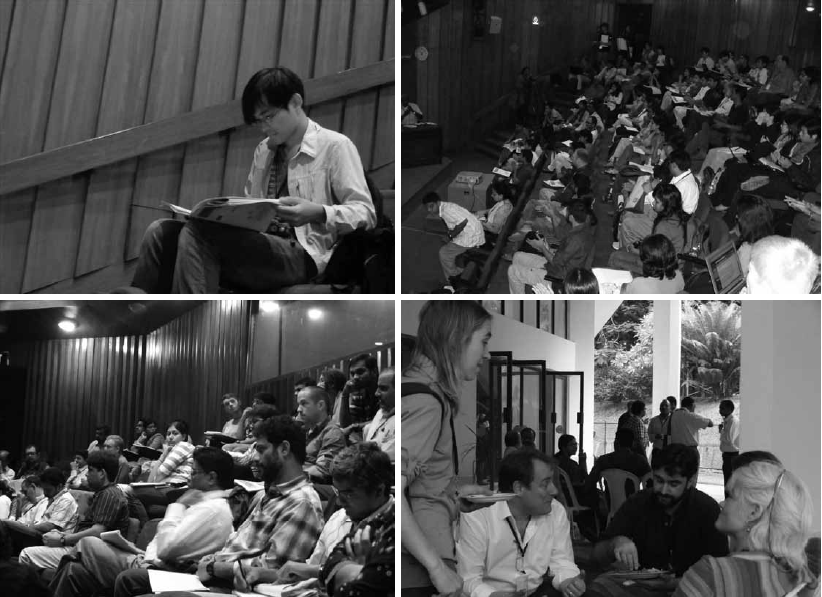 |
|
greater economic prosperity with
conserving biodiversity for achieving
Aichi Biodiversity Targets. Panelists
in this discussion were Ganesan
Balachander, Director, ATREE; Julia
Merton-Lefevre, DG-IUCN; Ravi
Prabhu, DDG, World Agroforestry
Centre; Kamal Bawa, ATREE founder
President; Sharad Lele, Senior Fellow
at ATREE; and Anne-Hélène Prieur-
Richard, Dy Director, DIVERSITAS.
ATREE also invested in an outreach
stall from 13-19th at the CBD’s
Interactive Fair for Biodiversity, where
students, educators, academics and
partners could get to know more
about ATREE’s work across India.
|
Experts expect that climate change
will aggravate climate variability,
which in turn will intensify waterrelated
stresses, especially for
marginalized groups.
ATREE organized an expert
consultation on water resource
management issues in the Arkavathy
basin on November 7, 2012. This
was the preliminary stakeholder
interaction of the ‘Adapting to climate
change in urbanizing watersheds’
project, which will first identify
stakeholder priorities to understand
which factors and pathways are most
relevant. It will combine biophysical
understanding with an understanding
|
of the socio-technical infrastructure
and institutional mechanisms through
which climate change impacts will be
felt by water users.
Participants represented a range
of scientific, government and nongovernment
institutions, including
Indian Institute of Science, Bangalore
Water Supply and Sewerage Board,
Karnataka Urban Water Supply and
Drainage Board, Central Ground
Water Board, State Pollution Control
Board, Water Resources Development
Organization, Arghyam, Svaraj and
Biome Environmental Solutions.
The objective of the meeting was to
arrive at a common understanding
of issues based on a review of
existing literature and data, and to
evolve consensus on future research
|
|
priorities. The meeting was organized
into sessions on water scarcity, water
quality, fair allocation of water and
sustainable water use.
This was part of the International
Development Research Centre (IDRC)
funded three-year project that
addresses water scarcity and water related
vulnerability in the context
of aggravating conditions of climate
variability and urbanization.
p>The project team consists of
Sharachchandra Lele, Veena
Srinivasan, Bejoy Thomas and
Priyanka Jamwal.
Education
In October, ATREE’s doctoral students
initiated a series of talks aimed at
inviting young scholars, including
PhD students, to share their work with
ATREE researchers. Tentatively called
Towards Interdisciplinarity, the series
emphasizes ATREE’s interdisciplinary
approach to research and seeks
to invite scholars from diverse
backgrounds, whose work overlaps
with ongoing research at ATREE.
The inaugural speaker was Hari
Sridhar, PhD student at the Centre
for Ecological Sciences (CES), Indian
Institute of Science, who drew from
his doctoral research to illustrate
the counterintuitive association of
similar bird species in bird flocks.
In November, Nachiket Kelkar,
researcher at the Nature Conservation
Foundation (NCF), spoke on marine
turtle herbivory among seagrass
meadows in the Lakshadweep
Islands, and the resulting impact on
fishing activities. In December, Sanam
Roohi, PhD student at the National
Institute of Advanced Studies
(NIAS), shared her recent findings
on transnational philanthropy based
on ethnographic fieldwork in Andhra
|
Pradesh and the United States among
the diasporic Kamma community.
The following week, Karpagam
Chelliah, doctoral student at CES,
discussed the intriguing case of
tuskless elephants, or makhnas, who
account for half of the male elephant
population in Kaziranga, and debated
whether it was a case of natural
or artificial selection. The Towards
Interdisciplinarity series is ongoing
and updates will be carried in future
issues of Branches.
PhD students team
Technology has made taking
photographs a relatively inexpensive
pursuit, and wildlife researchers
generally take thousands of images
when in the field. Instead of just
storing them on individual computers
and disk drives, the PhD students
have initiated a show called ‘Around
the field in fifteen minutes’. This slide
show presentation by the students
captures the travails, joys and insights
gained during interactions on the field.
As of end December, between six PhD
students and two RAs, eight episodes of
this slide show series were shared. The
diversity in topics and in landscapes,
and articulation of experiences and
understanding has proved educational
to audiences from research as well as
non-research backgrounds.
P Madegowda, PhD
The Puvidham School from
Nagarkoodal village, in Tamil Nadu,
follows a non-formal education system
with a curriculum based on the five
elements that make up the universe:
the sun, earth, water, air and space.
The medium of learning is story,
|
dance and song. ATREE’s conservation
education programme emphasizes
employing all the senses for achieving
an understanding of the world around
us. The two approaches have some
obvious synergies, which came into
play when the Puvidham students
visited ATREE’s MM Hills Community
Conservation Centre (CCC) this
September. The objective of the visit
was to provide exposure and hands on
experience on issues with many
shades and nuances—sustainable
livelihood, nature and man conflict,
social stratification, local culture and
importance of nature and wilderness
in life. The happy faces along with the
great comments from the school after
the 3-day visit speak for its success.
Activities, over the three days from
23rd to 26th September included
nature walks, bird watching, visit to
lantana craft centres, orientation on
the story of waste, cultural events,
introduction to wild edible plants,
interactions with Soliga school
children and community. Learning
about wild edible and medicinal plants
was something the children wanted
to do as part of their MM Hills visit.
Madesha, Sr. Field Assistant at the CCC,
showed them more than 60 species
of edible and medicinal wild plants.
He also showed them how to identify
the plants by touch, smell, taste and
physical characteristics. The children
were surprised to know that many
plants they considered weeds were
actually edible and good for health.
Dundi, the local expert, taught the
children to prepare a local delicacy
with green leaves, using a mix of
tamarind, chilli, garlic and salt. Hands on
crafting of articles from lantana was
the other uniquely MM Hills highlight.
This was part of the MM Hills CCC
initiative in local conservation and
environment education, which it has
been conducting from 2010.
Sharada Ramadass and
Sutapa Mukherjee
|
Outreach
VEMBANAD SPECIAL
ATREE CERC, Vibgyor film collective
and Salila wetland study centre of
St. Joseph’s College, Alappuzha,
organized Tharang 2012, a short film
festival. It was held on 6th and 7th
September. About 1500 participants
from 23 schools and colleges in
Alappuzha district took part in the
programme. The objective of the
festival was to sensitize students to
environmental issues.
Films that featured:
Veeduoru Poonkavanam: A 30-minute
documentary directed by Suresh
Elamon. It tells the story of backyard
biodiversity and our means to protect it.
Chitrakuzhal (which means binoculars).
Title of the English version is The Bird
Catcher: Directed by Majeed Gulistan.
Pachilakood (My home is green):
Animation film directed by Sajan
Sindhu and dedicated to the children
who lost their lives in the endosulfan
tragedy in Kasaragod district. It tells
the story of an ant and a caterpillar.
The ant, which loses its entire tribe
to the pesticide mishap, meets a
baby caterpillar and a relationship
develops between them. The story
moves ahead through the memories
of the ant and the metamorphosis of
the caterpillar.
Vrischikathile aalmaram: Adaptation
of the Russian short story, The Oak Tree
of Autumn, by Yuri Nagibin. It embodies
the message of a spiritual relationship
between human beings and nature.
Produced by the Sree Sarada Girls
Higher Secondary School.
|
One of the work-in-progress
revelations of ATREE’s participatory
resource mapping exercise at
Vembanad has been the red alert
on declining clam deposits in the
lake. Responding to the situation,
ATREE’s Vembanad Community
Environmental Resource Centre,
clam societies and Lake Protection
Forums met on 11 September 2012
to discuss ways to increase clam
deposits in the lake. Findings show a
dip in the eastern reaches of the lake.
One of the reasons being cited is the
obstruction of saline water intrusion
that gives the lake and its inhabitants
its particular environment. Dr. K. K.
Appukuttan, Ret. Principal Scientist,
CMFRI Cochin, led the sessions, along
with Dr. Priyan and Jojo T. D. of ATREE.
With mass decline of fishery
resources in Vembanad, the Lake
Protection Forums (LPF) around
Vembanad decided to conduct a
convention against unethical fishing
in Vembanad. The convention was
held on 13 July 2012 at Muhamma,
Alappuzha. The meeting was
presided over by District Director
of Fisheries, Alappuzha and
facilitated by Muhamma panchayat
President, Deeba Ajithkumar;
Mannanchery Panchayat member
Mr. Megahanathan; and Kainakary
Panchayat member, Mr. Sunil.
ATREE’s President, Dr. Bawa addressed
the gathering and released a
booklet on ‘Ethical Fishing Practices’
by Mr. K. M. Poovu, Secretary of
Lake Protection Forums and field
coordinator of ATREE’s CERC—
Community Environmental Resource
Centre. Mr. KrishnaKumar, Research
Associate, CERC defended ethical
fishing practices, sustainability and
spoke about advantages of traditional
fishing methods.
|
New
Niraj Kakati, Coordinator ATREE has
been nominated by the Ministry
of Environment & Forests, Govt.
of India on the Regional Expert
Committee undertaking Management
Effectiveness Evaluation of the
Protected Area network in India. The
sites will include National Parks and
Wildlife Sanctuaries in six states of
the North-eastern region.
Annesha Chowdhury has joined the
ATREE Eastern Himalayas Programme
as a Junior Research Fellow under the
TWST-funded project on ‘Integrated
approaches for adaptive resiliencebased
management of forests
supporting agro-ecosystems in the
Darjeeling-Sikkim Himalayas’.
B. Lakshmi is a student in the
programme in Environment and
Development at Ambedkar University
Delhi. She interned with the research
project on Ecosystem Services and
Poverty Alleviation in June and in
December 2012 to work on the
kendu leaf value chain and ecological
impact of harvest of kendu leaves in
Nayagarh district of Odisha.
Meghana Eswar and T. Md. Zuhail have
joined as Research Associates in the
project ‘Adapting to climate change
in urbanizing watersheds’ (ACCUWa)
funded by IDRC. She has an MSc in
Disaster Management from Tata
Institute of Social Sciences, Mumbai.
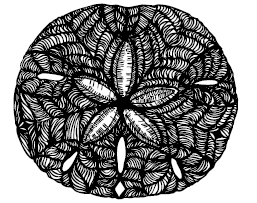
|
|
Roan Lakerveld joined the research
project on Ecosystem Services and
Poverty Alleviation in November
2012 as a volunteer, to work in
Odisha, on the institutional aspects
of distribution of ecosystem service
benefits from forests.
Biodiversity Asia. 7-10 Aug 2012.
Expert consultation on Arkavathy.
7 Nov 2012. Sponsors: IDRC
Bawa, K. S., S. Kadur. 2012. Himalaya:
Mountains of life. Bengaluru: Ashoka
Trust for Research in Ecology and the
Environment.
Kavitha, A., N. Deepthi, R. Ganesan,
S. C. Gladwin Joseph. 2012. Common
dryland trees of Karnataka: Bilingual
field guide. Bengaluru: Ashoka Trust
for Research in Ecology and the
Environment.
Priyadarsanan D. R., S. Devy, N. A.
Aravind, K. A. Subramanian and
S. Narayanan. 2012. Invertebrate
diversity and conservation in the
Western Ghats. Bengaluru: Ashoka
Trust for Research in Ecology and the
Environment.
Book chapter
Bawa, K., Ingty, T., 2012. Climate change
studies in Sikkim: an introduction.
In: Climate change in Sikkim: Patterns,
impacts and initiatives (eds. Arrawatia,
M. L., Tambe, S.). Gangtok: Information
and Public Relations Department,
Government of Sikkim.
Ingty, T., Bawa, K. S., 2012. Climate
change and indigenous peoples. In:
Climate change in Sikkim: Patterns,
impacts and initiatives (eds. Arrawatia,
M. L., Tambe, S.). Gangtok: Information
and Public Relations Department,
Government of Sikkim.
|
Killada, N. V., S. Badiger and B.K.
Thomas. 2012. Flood in Krishna
basin: Institutional responses to
flood regulation. In: Agony of floods:
Flood induced water conflicts in India.
(eds. Prasad, E., K. J. Joy, S. Paranjape
and S. Vispute). Pune: Forum for
Policy Dialogue on Water Conflicts in
India.
Lele, S. 2012. Economic incentives for
forest management. In: Deeper roots of
historical injustice. (eds Anonymous).
P. 101-124. Washington, D. C.: Rights
and Resources Initiative.
Articles
Balachander, M., O. K. Remadevi,
T. O. Sasidharan, N. Sapna Bai. 2011.
Virulence and mycotoxic effects of
Metarhizium anisopliae on mahogany
shoot borer, Hypsipyla robusta
(Lepidoptera: Pyralidae). Journal of
Forestry Research. 23(4): 651−659.
Harisha R. P. 2012. Present scenario
of user knowledge and availability
of wild edible plants in Male
Mahadehswara Hills, South India.
International Society of Ethnobiology
Newsletter.4 (1):10-12.
Heller, E., J. M. Rhemtulla, S. Lele,
M. Kalacska, S. Badiger, R. Sengupta
and N. Rama. 2012. Mapping crop
types, irrigated areas, and cropping
intensities in heterogeneous
landscapes of southern India
using multi-temporal mediumresolution
imagery: Implications for
assessing water use in agriculture.
Photogrammetric Engineering and
Remote Sensing 78(8): 815-827.
Kannan, R., C. M. Shackleton, Shaanker
R. U. 2012. Reconstructing the history
of introduction and spread of the
invasive species, Lantana, at three
spatial scales in India. Biological
Invasions DOI: 10.1007/s10530-
012-0365-z.
Paramesha, M. 2011. Sourcing
local solutions for conflict. Current
Conservation. 5(3): 38-39.
Sen, S., G. Ravikanth and N. A.
|
Aravind. 2012. Land snails (Mollusca:
Gastropoda) of India: Status, threats
and conservation strategies. Journal
of Threatened Taxa 4(11): 3029–3037.
Sundaram, B., S. Krishnan, A. J.
Hiremath and G. Joseph. 2012.
Ecology and impacts of the invasive
species, Lantana camara, in a socialecological
system in south India:
Perspectives from local knowledge.
Human Ecology. doi 10.1007/
s10745-012-9532-1.
Thomas, S. 2012. Tragedy on the
commons. Current Conservation. 5(3).
Ticktin, T., R. Ganesan, P. Mallegowda
and S. Setty. 2012. Disentangling the
effects of multiple anthropogenic
drivers on the decline of two tropical
dry forest trees. Journal of Applied
Ecology. 49: 774–784.
Working Papers
Lele, S. as member of the Karnataka
Elephant Task Force. Co-author,
report of the Karnataka Elephant Task
Force submitted to the High Court of
Karnataka. 12 Sept 2012.
Popular press
Atkore, V. My tryst with Mahseer.
Sanctuary Asia. December 2012.
Atkore, V. River of life. Deccan Herald.
7 January 2013.
Borah, J. et al. 2012. Tigers across
borders: Tigers in the Indo-Bhutan
Transboundary Manas Conservation
Complex. MNP/RMNP/WWF-India/
Aaranyak/ATREE/UWICE/Bhutan
Foundation, New Delhi.
Lele, S. Colonial hangover persists.
Down to Earth. June 16-30, 2012.
Lele, S. Standalone agency to map
green wealth. Economic Times.
12 May 2012.
Mallegowda, P. 2012. Do wildlife
corridors need protection? Sanctuary
Asia. October 2012. 70-71.
|
Invited talks/ lectures
Aditya, V. Microhabitat selection of
passerine birds in the tropical wet
evergreen forest habitats of Kalakad-
Mundanthurai Tiger Reserve, Tamil
Nadu, India. Indian Biodiversity
Congress 2012, Bengaluru. 11 Dec
2012.
Lele, S. Interdisciplinary analysis
of the environment: Insights from
research on tropical forests. School
of Human Ecology, Ambedkar
University Delhi. 9 Oct 2012; and at
National Institute of Advance Studies,
Bengaluru on 27 Dec 2012.
Priyadarsanan, D. R. Applying
principles of deliberative democratic
practices for the conservation and
sustainable management of heavily
used Vembanad backwaters of
Kerala. MG University, Kottayam.
6-8 Nov 2012.
Priyadarsanan, D. R. Changing
paradigms in conservation. National
seminar on ‘Biotechnology vs
biodiversity: Challenges and
options’, Sree Narayana College,
Kollam, Kerala. 21 and 22 Nov 2012.
Priyadarsanan, D. R. Taxonomy as an
interdisciplinary science for human
well-being. Indian Biodiversity
Congress, Bengaluru. 9 Dec 2012.
Shivanna, K. R. Pollen and pistil
biology. For post-graduate students,
Sacred Heart College, Thevara, Kochi.
14 September 2012.
Shivanna, K. R. Pollination biology:
How plants lure animals and use
them to disperse their pollen.
Sacred Heart College, Thevara, Kochi.
For XIth standard school students
under the INSPIRE (Innovation
in Science Pursuit for Inspired
Research) programme sponsored
by the Department of Science and
Technology to motivate young talent
to take up research in science.
13 September 2012.
|
Presentations and talks at
conferences
Atkore, V. Poster presentation on
‘Preliminary assessment of fish fauna
in the upper Malaprabha river basin
of the Western Ghats, India’. Authors:
Atkore, V., Krishnaswamy, J., Badiger,
S., and Shanker, K. At the BioAsia
Regional Seminar, Chinese Academy
of Sciences, Beijing. 5-7 Nov 2012.
Gurung, K. Presented her work on
the DBT-supported project ‘Invasive
species management in Sikkim:
Opportunities for community
livelihood enhancement’. Young
Ecologists Talk and Interact (YETI) 2012.
Organized by the Wildlife Institute
of India with the support of Doon
University, Dehradun. 5-7 Dec 2012.
Harisha, R. P. Uses of wild edible
plant resources by forest dependent
communities in southern India.
At Save Western Ghats Conclave
and Tribal festival. Three Soligas
(Dundamma, Chikamadaiah
and Madaiah H.) from MM Hills
attended and prepared wild food
plants recipes at the festival.
Mahabaleshwar, Maharashtra.
Organized by AERF, Pune. 30 Nov-
2 Dec 2012.
Khaling, S. Presented a poster on
the project ‘Integrated approaches
for adaptive resilience-based
management of forests for
supporting agro-systems in the
Sikkim-Darjeeling Himalayas’ at the
Sub-Global Assessment Network
Annual meeting organized in
Stellenbosch, South Africa by the
World Conservation Monitoring
Centre-UNEP. Nov 2012.
Lele, S. Ecosystem services: Origins,
contributions, pitfalls and way
forward. At workshop on ‘Nature,
power, knowledge’. Organized by
School of Human Ecology, Ambedkar
University, Delhi. 14 Dec 2012.
Lele, S. Biofuels: Where, how, at what
cost, for whom? At workshop on
‘Impact of biofuel on biodiversity’
organized by Raashtra Bandhu,
Bengaluru. 7 Nov 2012.
|
Lele, S. Panelist in side event on
‘Sustainable use of biodiversity’.
CoP11, Hyderabad. 17 Oct 2012.
Lele, S. Panelist in ‘Science is from
Venus, policy is from Mars: The rift
that complicates conservation’,
panel discussion in Biodiversity Asia.
8 Aug 2012.
Mallegowda, P. Presentation on
‘Multidisciplinary approach to
conserve wildlife corridors in
Mysore-Nilgiri landscape of Western
Ghats, India’. As part of the Global
Environments Summer Academy
2012 held in Munich, Germany.
18th Aug 2012.
Mallegowda, P. Presentation on
‘Assessing the socio-ecological
status of wildlife corridors for
better management in Mysore-
Nilgiri landscape of Western Ghats,
India’. At lab seminar organized by
ITES – Ecosystem Management, ETH
Zurich (Eidgenössische Technische
Hochschule Zürich), Switzerland.
27 August 2012.
Rai, C. Presented a poster on ‘Energy
use patterns in the Darjeeling
Himalayas: Opportunities for
sustainable use models’. Young
Ecologists Talk and Interact (YETI)
2012. Dehradun. 5-7 Dec 2012.
Rai, N. History, situated knowledge
and science in Protected Area
conservation. In a panel on
‘Protected Area governance in India
and the Forest Rights Act’ hosted by
Kalpavriksh. CoP Hyderabad.
Setty, S. Presented a paper on ‘Long
term monitoring of Apis dorsata
colonies in Biligiri Rangaswamy
Temple Wildlife Sanctuary, India’. At
Biodiversity Asia., 8 August 2012.
Shivanna, K. R. 6th International
Symposium on Zingiberaceae.
Organized by the Department of
Botany, University of Calicut, Kerala.
Chaired a paper presentation session
on ‘Reproductive biology, ecology and
conservation’. 10-13 September 2012.
The following two papers covering
our work were presented in the
symposium:
|
|
P. R. Nikesh, V. N. Dhanooj, P. A. Sinu
and K. R. Shivanna
Reproductive ecology of oesenbergia
pulcherima (Zingiberaceae) in
Southern Western Ghats.
Sinu P. A., G. Kuriakose and K. R. Shivanna
Floral and visitor behaviour influence
pollination in Indian cardamoms.
Conferences attended
ATREE put up an outreach stall at
CoP, India Biodiversity Congress and
National Biodiversity Congress. On
display was information regarding
the Academy for Conservation
Sciences and Sustainability Studies,
ATREE research and research posters,
publications and newsletters.
Gazmer, A. and Ingty, T. Third National
Research Conference on Climate
Change, Bengaluru. 3-4 Nov 2012.
Ingty, T. Biodiversity Asia. Bengaluru.
7-10 Aug 2012.
Ingty, T. International conference
on climate change impacts
and adaptation for food and
environmental security. SEARCA,
Los Baños, Laguna, Philippines.
21-22 Nov 2012
|
Courses attended
Mallegowda, P. Participated in the
Global Environments Summer
Academy 2012 (GESA 2012) held
in Munich, Germany. Organized and
hosted by the Rachel Carson Center
for Environment and Society and
the Global Diversity Foundation.
At Munich’s Ludwig Maximilian
University, as part of the Munich
International Summer University,
Germany. 3-4 August 2012.
Grants
Allwin Jesudasan and T. Ganesh
received a grant of US$20,000 in
support of their proposed project
‘Birds, wetlands and people -
what makes them to coexist in
a globalizing world?’ from the
National Geographic Society’s
Conservation Trust.
Harisha, R. P. got the Rufford Small
Grant to work on conservation of
rare, endangered and threatened
wild plants species through
community participation in MM
Hills. Period: December 2012 to
June 2013.
|
Khaling, S. US$ 66,209 from IUCN
– SOS (Save our Species) Grant for
project ‘Conserving the Critically
Endangered white-bellied heron,
Ardea insignis in key sites of the
Manas Tiger Reserve in Assam, India’.
Period: Dec 2012 to Jun 2014.
Mallegowda, P. Rachel Carson Center
for Environment and Society and
the Global Diversity Foundation
supported of 1500 Euros through
the Salvia Foundation to attend
the Global Environments Summer
Academy 2012 held in Munich,
Germany from 3rd-24th Aug 2012.
The Edda G. Sehgal Foundation travel
grant also supported the same.
Vembanad CERC. Stakeholder meet
among the Ramsar sites of India.
MoEF. Grant of INR 6 lakhs.
Vembanad CERC. Biodiversity festival
and preparation of biodiversity
register in select schools of
Vembanad under the National
Environmental Awareness Campaign
(NEAC) of MoEF.
New research projects sanctioned/
launched
Climate change in South Asia:
Climate vulnerability and adaptation
in urbanizing watersheds. Sanctioned
in June 2012; launched Sept 2012.
|
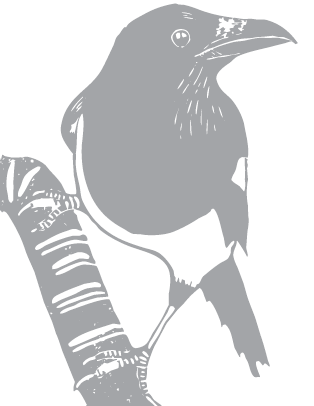 |

|
|
 www.atree.org www.atree.org
This newsletter has been put together from reports by ATREE folk. Design and lay out is by Salil Sakhalkar. Editing by Samuel Thomas, Ganesan Balachander and Meetu Desai.
|
Head Office
Bangalore
Royal Enclave, Sriramapura
Jakkur Post, Bangalore 560 064
Tel: +91-80-23635555,
Fax: +91-80-23530070
Regional offices
Eastern Himalayas
Khangsar House,
Above Brahmakumari,
Development Area
Gangtok 737101
Tel: +91-3592-206 403
New Delhi
2nd Floor, 1, K Commercial Complex
Birbal Road, Jangpura Extension
New Delhi 110014
Tel: +91-11-2432 3133
Governing Board
Dr. Kamaljit S. Bawa ( Chairman)
Dr. K. N. Ganeshaiah
Dr. R. Uma Shaanker
Dr. S. N. Rai
Mr. Darshan Shankar
Ms. Rohini Nilekani
Dr. Surinder M. Sehgal
Dr. Jeta Sankrityayana
Ms. Seema Paul
Ms. Pheroza J. Godrej
Dr. K. S. Jagadish
Mr. A. N. Singh
Dr. Ganesan Balachander
Dr. Gladwin Joseph ( ex-officio)
Dr. Priyadarsanan Dharma Rajan( faculty)
Executive Committee
Dr. Gladwin Joseph ( Chair)
Dr. Bejoy Thomas
Dr. Seema Purushothaman
Dr. Siddhartha Krishnan
Dr. Siddappa Setty
Mr. Ramesh N
Dr. Priyadarsanan Dharma Rajan
Dr. Sarala Khaling ( ex officio)
Mr. Sridhar R Iyengar ( ex officio)
|
Advisory Board
Pl note: * will also serve on the Faculty Advisory Committee
* Dr. Vijay Raghavan, Director, National Centre for Biological Sciences, Bengaluru
Dr. Raghavendra Gadagkar, INSA SN Bose Research Professor and JC Bose National Fellow, Centre for Ecological Sciences, Bengaluru
* Dr. Amita Baviskar, Associate Professor, Institute of Economic Growth, Delhi
* Dr. Navroz K. Dubash, Senior Fellow, Centre for Policy Research, New Delhi
* Dr. Gita Sen, Professor, Centre for Public Policy, Indian Institute of Management, Bengaluru
Mr. Raj Khoshoo, Senior Vice President, Siemens PLM, CA, USA
Ms. Kalpana Sharma, independent journalist, Mumbai
Dr. Ravi Chopra, Director, People’s Science Institute, Dehradun, Uttarakhand
* Dr. S. P. Singh, Former Vice Chancellor, Advisor, State Planning Commission, Government of Uttarakhand, Dehradun, Uttarakhand
Dr. Ramesh Singh, Director, Learning, Monitoring and Evaluation, Office of the Director of Programs, Open Society Institute, New York
Convenors and Programme Leaders
Dr. Jagdish Krishnaswamy,
Ecosystem Services and Human Well-being and Convenor, Suri Sehgal Centre for Biodiversity and Conservation
Dr. Sharachchandra Lele,
Forests and Governance and Convenor, Centre for Environment and Development
Dr. Priyadarsanan Dharma Rajan and Dr. Ankila Hiremath,
Ecosystems and Global Change
Dr. Shrinivas Badiger
i>Land Water and Livelihoods
Academy
Dr. Gladwin Joseph,
Convenor, Academy for Conservation
Science and Sustainability Studies
|
|

